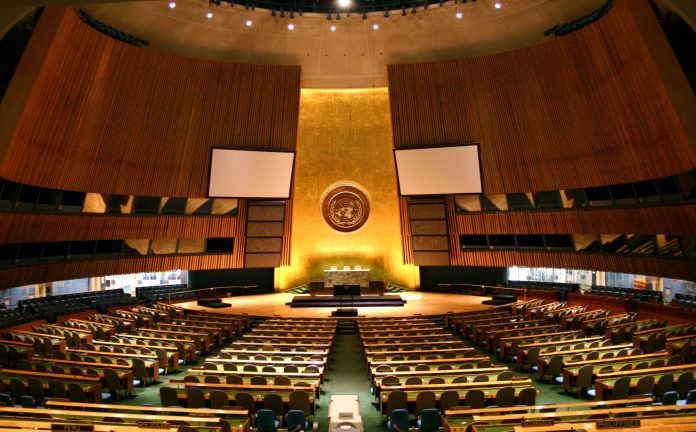UNITED NATIONS, For the 29th year, the United Nations General Assembly voted overwhelmingly Wednesday to condemn the U.S. economic, commercial and financial embargo on Cuba, as many diplomats called for an immediate end to the sanctions, particularly amid global efforts to fight against the coronavirus pandemic.
The in-person meeting of the 193-member Assembly also heard calls on the Biden administration to resume the reconciliation with the island nation in the Caribbean Sea under the Obama administration that was upended by former President Donald Trump.
In the voting 184 countries supported the condemnation, with only the United States and Israel opposing it, and Brazil, Colombia and Ukraine abstaining.
Four countries did not vote — Central African Republic, Myanmar, Moldova and Somalia.
The United States consistently voted against the U.S. resolutions for 24 years but abstained for the first time in 2016 under former President Barack Obama, as Washington and Havana began a process to reconcile their differences
Washington then returned to opposing the resolution under President Trump’s administration. Trump also rolled back nearly all measures Obama had taken to ease the embargo and improve ties between the United States and its old Cold War foe.
Biden vowed during his campaign to reverse some of Trump’s Cuba measures that “have inflicted harm on the Cuban people and done nothing to advance democracy and human rights.” But he has yet to make good on that pledge and his administration has said a shift in policy toward Cuba is not among its top priorities.
With overwhelming backing from the international community, the resolution has been approved ever since 1992 when the General Assembly began to vote annually on the issue, with the sole exception of 2020, due to the restrictions imposed by the pandemic.
While the Assembly’s vote carries political weight in terms of international diplomacy, only the US Congress can lift the economic blockade in place for five decades.
Cuban Foreign Minister Bruno Rodríguez Parrilla, present during the vote in the General Assembly Hall, said that the blockade was a “massive, flagrant and unacceptable violation of the human rights of the Cuban people”.
He added that the embargo is about “an economic war of extraterritorial scope against a small country already affected in the recent period by the economic crisis derived from the pandemic”. Rodriguez estimated 2020 losses to be $9.1 million.
The diplomat said that the sanctions have made it harder for his country to acquire the medical equipment needed to develop coronavirus vaccines as well as equipment for food production.
“Like the virus, the blockade asphyxiates and kills, it must stop”, he urged.
Meanwhile, Political Coordinator for the US Mission, Rodney Hunter, said during the vote that sanctions are “one set of tools in Washington’s broader effort toward Cuba to advance democracy, promote respect for human rights, and help the Cuban people exercise fundamental freedoms”.
He underscored that despite the blockade, the US recognizes “the challenges of the Cuban people” and therefore, the US was “a significant supplier of humanitarian goods to the Cuban people and one of Cuba’s principal trading partners”.
“Every year we authorize billions of dollars’ worth of exports to Cuba, including food and other agricultural commodities, medicines, medical devices, telecommunications equipment, other goods, and other items to support the Cuban people. Advancing democracy and human rights remain at the core of our policy efforts”, he said.
Follow the PNI Facebook page for the latest news and updates.









